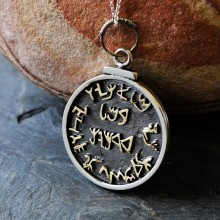
תליון מלאכי השומר בכסף זהב
להביא לעונד הגנה ותחושת שלווה פנימית מתוך ידיעה שמלאכי האל שומרים עליו.
The new pendant is part of the Guardian Angel collection. It is based on the verse taken from Psalms 91:11: “For he will give his angels charge over thee, to keep thee in all thy ways.” The fonts I've used for this talisman are the original ancient Hebrew fonts that were used in the Torah from the 9th century BC.
This chapter serves to protect Jewish tradition. The verse hints at the heavenly protection and the messengers of G-d - the angels that accompany the man. Heavenly protection like Jacob received on his hard and long road. The angels are the ones that the divine spirit dwells in them.
In Judaism, angels (Hebrew: מַלְאָךְ, "messenger") are supernatural beings who serve as agents of the God of Israel. They appear throughout the Hebrew Bible, rabbinic literature, Jewish philosophy, and mysticism, often depicted as beings of fire. The Hebrew word for "angel" (mal’ākh) also means "messenger" and shares roots with similar words in Arabic and other languages.
Angels appear in many biblical stories, such as those involving the Patriarchs, Moses, and figures like Jacob, Hagar, and Balaam. Various parts of the Bible introduce the idea of a "Heavenly host," a divine assembly, and specific types of angels like Seraphim, Cherubim, and Ophanim.
In rabbinic literature, angels are placed within a hierarchy, with Michael, Gabriel, Uriel, and Raphael being the four archangels. The Talmud compares sages to angels in terms of knowledge and wisdom, and angels themselves are often portrayed as scholars, halakhic experts, and teachers. This connection between sages and angels reflects the intellectual elite status of the rabbis in Babylonian tradition.
The Kabbalah provides an extensive description of angels, portraying them as forces that transmit information and sensations between humanity and the Tetragrammaton (God's name). They are compared to atoms, wavelengths, or channels that assist God in creation and, therefore, should not be worshipped, prayed to, or invoked. Angels are spiritual, not physical, entities—like spiritual atoms. When they appear in the Hebrew Bible, their descriptions are shaped by the perspective of the person experiencing the vision or prophecy, often in anthropomorphic terms. However, they remain non-material, representing emotions, feelings, or forces, all directed by God for the purpose of creation.
In that sense, the meaning of these pieces of jewelry is to connect and harness these cosmic forces that are guided by the source of creation.
In practical Kabbalah, which is the mystical branch of Jewish esotericism focused on influencing the spiritual realm, angelic names are considered powerful tools. These names are believed to channel specific spiritual forces or energies. However, their use is approached with caution, as improper usage is thought to be dangerous or spiritually harmful. Here's how angelic names are used in practical Kabbalah:
1. Divine Invocation
Angelic names are invoked to call upon their spiritual influence. Kabbalists believe that each angel has a specific role or governs particular forces of the universe. By calling upon the right angelic name, a practitioner can seek assistance in areas like protection, healing, or enlightenment. The names are often used in prayers, incantations, or meditations.
2. Protection and Safeguarding
Kabbalists use angelic names as part of protective practices. Amulets or talismans inscribed with angelic names are worn or placed in homes to shield individuals from harm or evil forces. The names are believed to create a protective barrier between the physical and spiritual realms.
3. Healing
Certain angelic names are invoked for healing purposes. In these practices, the angel associated with healing is called upon to help restore balance to the body or soul. The angel Raphael, for example, whose name means "God heals," is commonly invoked in healing rituals.
4. Mystical Meditation
Some Kabbalists use angelic names as focal points during meditation to ascend spiritually or gain deeper insights into divine wisdom. By concentrating on the names and their meanings, practitioners seek to align themselves with higher spiritual energies and achieve states of heightened awareness.
5. Ritual and Magic
In Kabbalistic rituals, angelic names may be used in combination with Hebrew letters, sacred geometry, and specific prayers. These rituals aim to effect change in the spiritual realm, which in turn influences the material world. Such practices are highly structured and require detailed knowledge of the angels' roles and correspondences with divine energies.